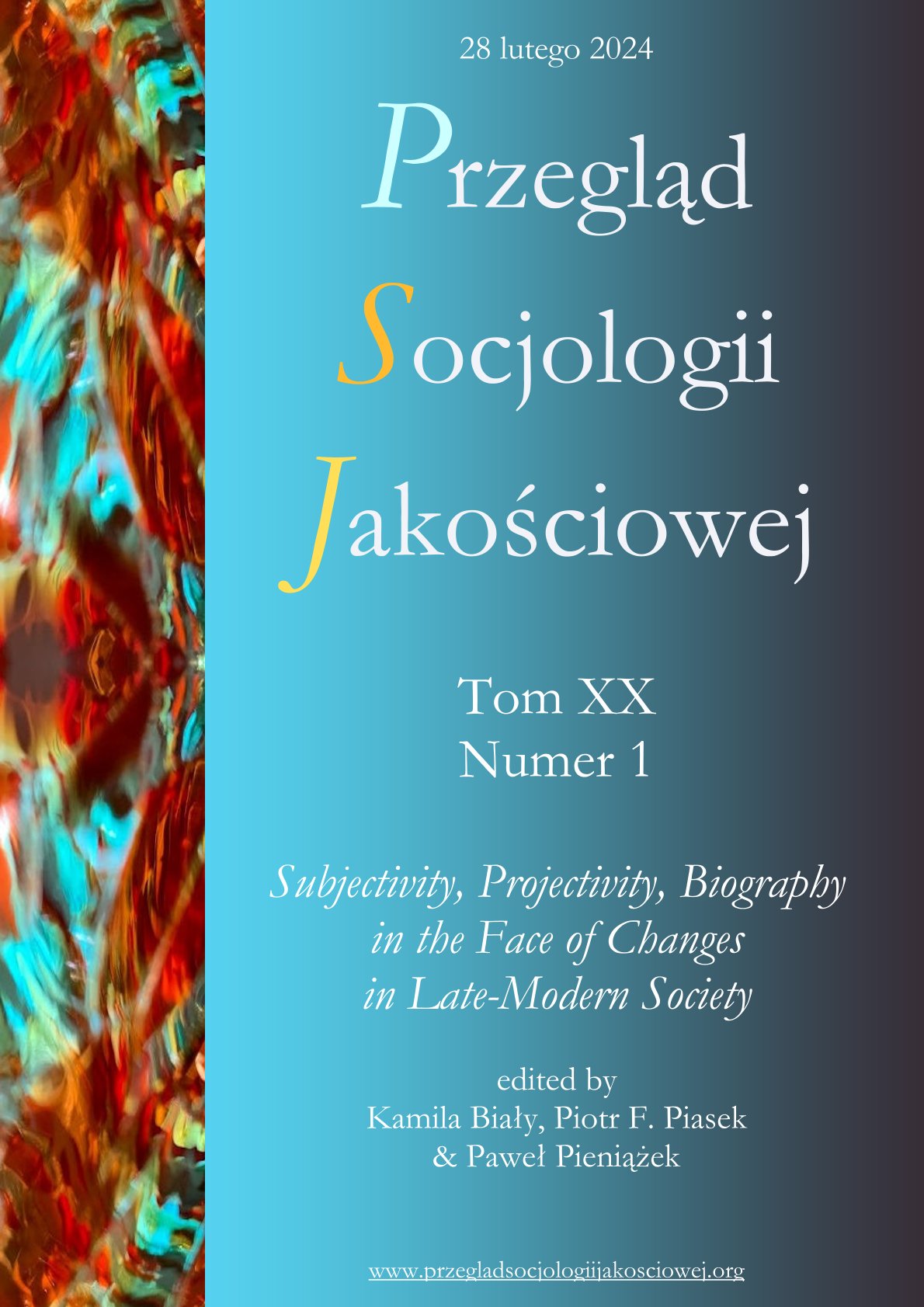Late Modern Projectivity and Existentialism
DOI:
https://doi.org/10.18778/1733-8069.20.1.04Keywords:
modernity, late modernity, project, existentialism, anxiety, temporalityAbstract
The article addresses the issue of the relationship between existentialism and late modern projectivity interpreted in terms of project work and of biographical projectivity. It does so from the perspective of transformations of subjectivity in modernity and late modernity, and, therefore, from the perspective of the process of individualization. The objective is to answer the question of the belonging of existentialism to one of these sociocultural formations. For these purposes, some major categories of existentialism such as project, anxiety, and temporality are analyzed. Their analysis leads to the conclusion that there is a close, structural correlation between existentialism and sociocultural structures of modernity as well as that existentialism, in contrast to late modern projectivity, has some emancipatory potential related to its alienating status in modernity. The article refers to the methodology of qualitative sociology.
Downloads
References
Baethge Martin (1991), Arbeit, Vergsellschaftung, Identität – Zur zunehmenden normativen Subjektivierung der Arbeit, “Soziale Welt”, vol. 42(1), pp. 6–17.
Google Scholar
Bauman Zygmunt (2000), Liquid Modernity, Cambridge: Polity Press.
Google Scholar
Bauman Zygmunt (2001), The Individualized Society, Cambridge: Polity Press.
Google Scholar
Beck Ulrich (1992), Risk Society. Towards a New Modernity, London: Sage Publications.
Google Scholar
Beck Ulrich (2002), Społeczeństwo ryzyka, translated by Stanisław Cieśla, Warszawa: Scholar.
Google Scholar
Beck Ulrich (2009), Ponowne odkrycie polityki: przyczynek do teorii modernizacji refleksyjnej, [in:] Ulrich Beck, Anthony Giddens, Scott Lash (eds.), Modernizacja refleksyjna, translated by Jacek Konieczny, Warszawa: Państwowe Wydawnictwo Naukowe, pp. 11–78.
Google Scholar
Biały Kamila, Piasek Piotr (2024), On social emergence. Non-dichotomous approach to qualitative data analysis, “Przegląd Socjologii Jakościowej”, vol. XX, no. 1 , pp. 18–39.
Google Scholar
Birken Thomas (2012), Projektarbeit – arbeitssoziologisch gedeutet, https://www.researchgate.net/publication/288489694_Projektarbeit__arbeitssoziologisch_gedeutet (accessed: 18.12.2022).
Google Scholar
Bröckling Ulrich (2005), Projektwelten. Anatomie einer Vergesellschaftungsform, “Leviathan”, vol. 3, pp. 364–383.
Google Scholar
Giddens Anthony (1991), Modernity and Self-Identity. „Self” and Society in the Late-Modern Age, Cambridge: Polity Press.
Google Scholar
Heidegger M. (1996), Being and Time, translated by Joan Stambaugh, Albany: State University of New York Press.
Google Scholar
Rosa Hartmut (2012), Przyśpieszenie społeczne. Etyczne i polityczne konsekwencje desynchronizacji społeczeństwa wysokich wartości, „Ethos”, vol. 99(3), pp. 78–116.
Google Scholar
Rosa Hartmut (2020), Przyśpieszenie, wyobcowanie, rezonans. Projekt krytycznej teorii późnonowoczesnej czasowości, translated by Jakub Duraj, Jacek Kołtan, Gdańsk: Europejskie Centrum Solidarności.
Google Scholar
Sartre Jean-Paul (1956), Being and Nothingness. An Essay on Phenomenological Ontology, translated by Hazel Estella Barnes, New York: Philosophical Library.
Google Scholar
Sennett Richard (2006), Korozja charakteru. Osobiste konsekwencje pracy w nowym kapitalizmie, translated by Jan Dzierzgowski, Łukasz Mikołajewski, Warszawa: Wydawnictwo Literackie Muza SA.
Google Scholar
Sennett Richard (2010), Kultura nowego kapitalizmu, translated by Grzegorz Brzozowski, Karol Osłowski, Warszawa: Wydawnictwo Literackie Muza SA.
Google Scholar
Wagner Peter (1995), Soziologie der Moderne, Frankfurt–New York: Campus.
Google Scholar
Published
Versions
- 2024-03-14 (2)
- 2024-02-28 (1)
How to Cite
Issue
Section
License

This work is licensed under a Creative Commons Attribution-NonCommercial-NoDerivatives 4.0 International License.
Funding data
-
Narodowe Centrum Nauki
Grant numbers UMO2017/27/B/HS1/00462














